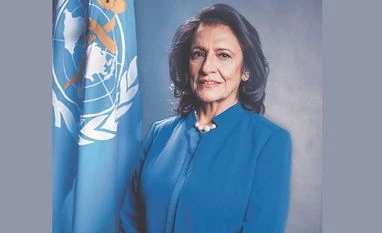New Delhi [India], April 18 (ANI): With India set to establish WHO Global Centre for traditional medicine in Jamnagar, Gujarat, Dr Poonam Khetrapal Singh, Regional Director, WHO South-East Asia Region has called it a "game-changer."
Traditional medicines, she said have been around for millennia and pointed out that nearly 80 per cent of people, in 170 of 194 WHO member countries use them.
"Despite their widespread use, traditional medicine lack robust evidence, data and a standard framework preventing their integration into the mainstream healthcare delivery system," Dr Singh said in an exclusive interview with ANI.
"WHOs Global Centre for traditional medicine could be a game-changer by focusing on evidence and learning, data and analytics, sustainability and equity, innovation and technology to help harness the ancient wisdom and power of traditional medicine, and to advance the SDG 3 target of ensuring health and promoting wellbeing for all of all ages," she added.
Dr Singh said that Prime Minister Narendra Modi spoke to Director-General of the World Health Organization (WHO), Dr Tedros Ghebreyesus and expressed India's keenness in establishing and hosting the GCTM in India so as to harness the potential of traditional medicine from across the world through modern science and technology to improve the health of people and the planet.
Also Read
The Government of India last month signed the 'Host Country Agreement' with WHO for establishing WHO Global Centre for Traditional Medicine in India at Jamnagar, Gujarat, with its interim office at the Institute of Training and Research in Ayurveda in Gujarat. "Indian Government has generously agreed to support the setting up of the GCTM and its activities for the first ten years," Dr Singh said.
Noting that the COVID-19 pandemic is stretching and impacting the health systems across the world, Dr Singh pointed out many countries felt the need to mobilize all available resources to recover from the pandemic and accelerate progress towards SDG 3 goals.
"The emerging burden of NCDs and mental illnesses have also created a demand for integrating evidence-based traditional medicine into the healthcare delivery system to promote health and wellbeing," she said.
Highlighting the objectives and mission of the global centre, she said that it will concentrate on building a solid evidence base for policies and standards on traditional medicine practices and products which will help countries integrate it as appropriate into their health systems and regulate its quality and safety for optimal and sustainable impact.
"It will focus on four main strategic areas - evidence and learning; data and analytics; sustainability and equity; and innovation and technology to optimize the contribution of traditional medicine to global health and sustainable development," Dr Singh said.
Noting that such a centre is first of its kind, Dr Singh said that it will focus on gathering evidence and data to inform policies, standards and regulatory frameworks for safe, cost-effective and equitable use, evidence and learning, data and analytics, build on sustainability and equity and use innovation and technology to promote cooperation and synergy between traditional medicine and modern allopathic medicine.
"It will promote cooperation and synergy between traditional medicine and modern allopathic medicine so that allopathic and traditional medicines can work together integrating best features of each system, to achieve universal health care and the triple billion targets to achieve measurable impacts on people's health," she said.
However, Dr Singh said that at present, there is no proposal to start any more such centres.
(Only the headline and picture of this report may have been reworked by the Business Standard staff; the rest of the content is auto-generated from a syndicated feed.)
)